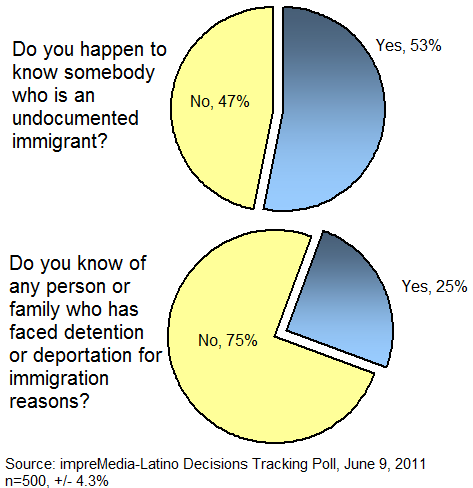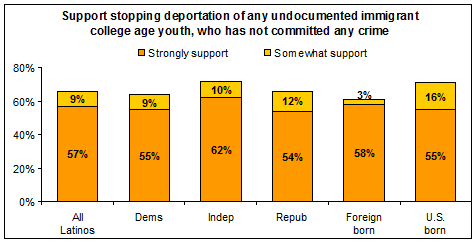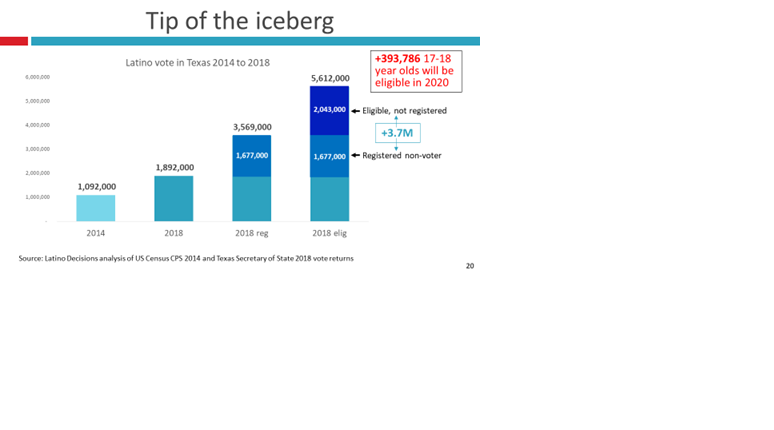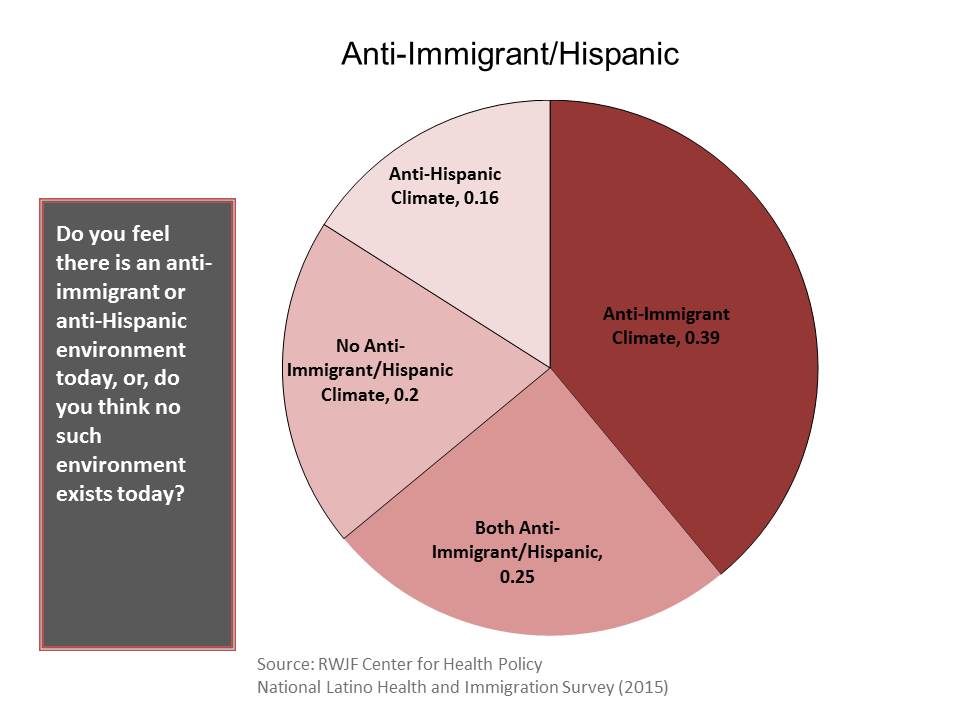By Pilar Marrero, impreMedia, [email protected] | 2011-06-09
LOS ANGELES, Calif. – Latino voters are not unfamiliar with the critical situation faced by undocumented immigrants who live in the United States. A majority of these voters (53%) said they know someone who is undocumented, while one-fourth (25%) said they know a person or family who is facing deportation or has been deported.
These are some of the results of an impreMedia/Latino Decisions (LD) poll. This is the third in a series of six national polls exploring the opinions of the Latino group that has best integrated into American society: registered voters. This particular poll focused on the immigration issue.

Matt Barreto, a political science professor at the University of Washington and pollster for LD, said poll results refute the idea that Latino voters are uninterested or uninvolved with what is happening to undocumented immigrants.
“It proves what we know anecdotically, that the immigration issue is something very personal for Latinos, unrelated to political ideology. In their personal relationships, Latino voters feel the effect of the decisions made in this country about immigrants,” said Barreto. “That’s why these decisions can even affect the political choices of a second or third generation of Latinos born here.”
Gabriel Sánchez, a political science professor at the University of New Mexico, said these results are surprising at first glance.
“We’re talking about registered Latino voters. However, their direct and personal connection with the problems of the undocumented helps explain why even Latinos who were born in the United States, whose dominant language is English, have liberal attitudes with regards to immigration policy,” said Sánchez. “This is something many people in the U.S. don’t completely understand.”
This topic is so significant that 51% of Latino voters consider the immigration issue (comprehensive reform, the DREAM Act) as the most important issue currently facing their community. On the other hand, 35% said the most important issues were the economy and creating jobs. Education came in third at 18%.
If Congress does not pass immigration reform, these voters support having the president use his executive powers to resolve some of the pressing problems certain groups of undocumented immigrants are experiencing. Among them, 66% would support an executive order from the president to stop the deportation of undocumented immigrants who are minors or of college age and have a clean, crime-free record. This support is consistent among Latinos of all ideologies, origins and political affiliations, including 54% of Republicans.

This group also does not see a need to continue increasing border security and using more resources for deportations. When asked whether they think this is necessary, 29% answered yes, while 62% said they oppose it. Of the latter, 49% were “strongly opposed.” Other possible solutions for which poll respondents support the use of executive orders: 60% support stopping the deportation of undocumented parents with children under 18, who have not committed a crime; and 74% support stopping the deportation of undocumented immigrants who are married to U.S. citizens or legal residents.
“A clear majority of Latino voters favor having President Obama use his executive powers so there is more discretion when it comes to detentions and deportations. They clearly want to see an end to the deportations of young students, parents whose children are citizens, and people who are married to citizens or residents,” said Barreto.
Respondents were also asked about a series of state policies related to immigration. Of them, 56% are opposed to laws requiring state or local police to ask people for documents to verify their immigration status, while 29% support these laws. In contrast, 52% would support a law clarifying that only the federal government can request immigration documents. Additionally, 78% support laws allowing undocumented students to pay in-state tuition rates for college.
The survey also found there is solid support—which had been reflected in previous polls of Latino voters—for comprehensive immigration reform. Every group of Latino registered voters, even independents and Republicans, supports reform; this support ranges between 66% and 80%, depending on the sub-category. All of these are solid majorities.
This support includes a process under which people benefiting from legalization must pay taxes and pass a background check (84%) and must have lived in the country for at least two years (69%). There is less support for requiring them to pay a $1,000 fine (48% support; 46% oppose), and requiring them to return to their country of origin before receiving papers (40% support; 53% oppose).
Latino voters also feel as though an anti-immigrant and anti-Hispanic environment exists in the public discourse in the United States: 60% said an anti-immigrant environment is definitely there, while another 16% said this environment exists somewhat—a total of 76%.
Methodology
Latino Decisions polled 500 registered voters between May 24 and June 4 in the 21 states with the largest Hispanic populations, representing 95% of the electorate. Those interviewed were selected at random from voter lists. The poll includes interviews conducted via cell phone. The margin of error is /-4.3%. The interviews were conducted in English or Spanish, as requested by the interviewee.


